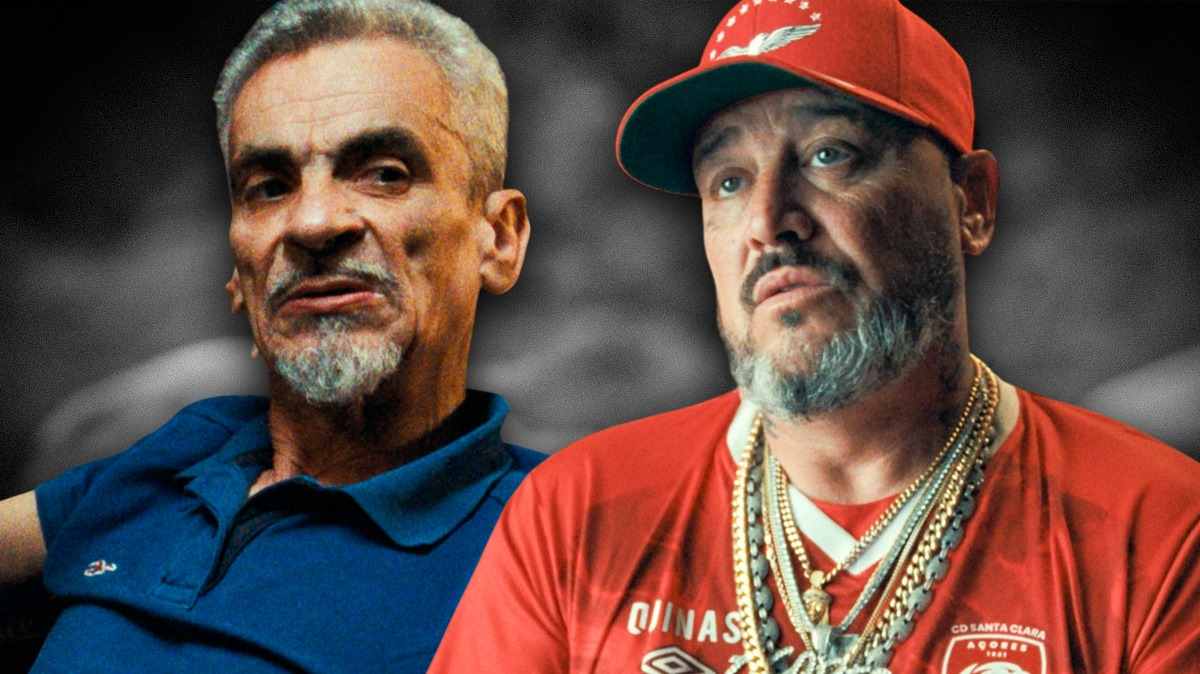'Turn Of The Tide' True Story: Where Are Antonio Quinci And His Gang Now?
1 day ago
Turn of the Tide: The Surreal Story of Rabo de Peixe is a new Portuguese documentary film on Netflix that tells the bizarre story of Rabo de Peixe, a small island parish located in the Azores autonomous region of Portugal. In 2001, the small island and the lives of its inhabitants were changed forever when a boat carrying large amounts of cocaine seemingly ran aground close to it, leading to rampant drug trafficking all over the island, leading to comical and then concerning situations. Although Turn of the Tide is not edited as crisply as most modern documentaries are, it still makes for a compelling and entertaining watch.
What is the background of Rabo de Peixe?Just as the documentary does, it is first important to establish the background of Rabo de Peixe, a historically neglected and overlooked part of Portugal. Officially part of the autonomous region of Azores, the island is located about 1400 kilometers (750 nautical miles) away from mainland Portugal. Most of the residents of the small towns of the islands have been historically poor, not receiving much support from the government in terms of facilities or aid. As is often the case with financially struggling regions that are literally in the middle of the Atlantic Ocean, crime found a stronghold on the island, with a lot of youngsters opting to join gangs selling drugs and engaging in prostitution. This was particularly helped by the fact that the island was easily accessible to criminals from four different continents, and its remote location meant that it was generally much more difficult for the authorities to look for fugitives there than usual.
The geographic location of the Azores is also very crucial in its background, as it happens to be the first inhabited piece of land on the course of any ship sailing from the Americas to Europe. Essentially, the island and the greater archipelago of the Azores act as the gateway to Europe while taking the aquatic route from the Americas. This became very pertinent in the 1980s and 90s, when thousands of immigrants from Portugal, Spain, and Italy were moving to the United States in search of a better life. Many of the immigrants ended up being disillusioned by the American dream and resorted to a life of crime and violence, with most becoming drug dealers. Almost all the immigrant ghettos in cities like New York and Boston had their own drug-dealing gangs, which brought them under a lot of legal persecution as well.
In many cases, the American government decided to deport immigrant criminals back to Europe, sometimes even after they had served their sentences in the USA, and the easiest way to do so was to take the oceanic route and simply dump them at the Azores. This led to a direct influx of criminals on the island, and their comparatively close proximity to South America, where drug lords were looking to expand their businesses, was also exploited. Even before the turn of the century, Rabo de Peixe had its own problems with drug and gun-related violence. Some of the men appearing in the documentary had already been arrested by the police numerous times for illegal possession of drugs and weapons. But nobody could have estimated the kind of effect the incidents from 2001 would have on the small island and its people, inadvertently changing their lives forever. Whether this change was good or bad really depends on whom you ask.
How did cocaine spread all over the small island?On the 7th of June, 2001, a fisherman went out to the coast as per his usual routine and saw numerous fishing weights, or sinkers, laid out on the beach. In order to protect the sinkers from rain and wind, he started moving them into one of the many caves on the beach, and this is when he noticed many bags at the back of the cave. Intrigued by what they were, the fisherman started unpacking one of the bags, and he now recalls how the intricate packaging took him almost 30 minutes to completely get rid of. Once he could see the contents of the bag, a thick brick of white powder, there was no doubt in his mind that someone had hidden a large stash of cocaine inside the cave. The fisherman quickly called the Public Service Police, who came and seized close to 300 kilos of cocaine from the place. It was evident that whoever had hidden the drugs had intended to come back later and retrieve them, as flags and ropes had been placed outside the cave to distinguish it.
This was not the end of the matter, but just the beginning, as something wildly unexpected happened just a few days later, on the 16th of June. Packages full of cocaine started washing up on beaches all over Rabo de Peixe and the other islands of the Azores, naturally creating a lot of buzz among the citizens. People started gathering at the beaches and inner channels to watch these packages float in and also to collect them, more out of intrigue than anything else. While some people were aware of what cocaine was, and so they started collecting as much as they could, simply to snort them at parties; most were unaware of the drug, its effect, and its value.
Bizarre stories can be heard of children throwing packets of cocaine at each other and smashing them against walls, simply as part of innocent play. They apparently used the drug as white powder to mark the goal lines on their football fields. Some rumors state that many women, especially the elderly ones, felt that the white powder that suddenly started showing up at the beaches and the market was an effective binding agent to use in their fried fish recipes. Things went absolutely haywire, as people figured out how the powder, irrespective of what it was, could be easily bought and sold. Mere plastic cups were used to sell cocaine at the market, since that was just the most convenient method to quantify it, and such cups were sometimes sold at just a few escudos, which was the country’s currency before the switch to the euro in 2002.
However, to those who had a fair idea about the value of the drug, particularly those who had been sent back from the United States after they had committed drug-related crimes, this was like an occasion of grand celebration. Many such people considered this bizarre incident to be a direct grace from Jesus Christ, who was apparently sending packets of drugs from the sea just to help them uplift their lives. These men set up an organized structure to acquire, store, and sell the packets of cocaine, and they soon got hold of buyers from the mainland as well as from foreign countries. A rudimentary drug racket was set up on the small island, which successfully continued for many years, truly changing the lives of many who partook in the business.
What were the consequences of the sudden introduction of drugs?This sudden and unnatural introduction of cocaine into Rabo de Peixe instantly had a series of impacts, with a select few suddenly growing rich being the only positive one. It did, in a way, level out the social and class differences, as cocaine has generally been considered a drug accessible only to the rich. Yet, people from the lower and middle classes had so much of it on the Portuguese island, not only getting to experience its high themselves but also selling it to make large amounts of money. But the negative impacts far outweighed all this, starting with the fact that most of the people had no idea about the strong effect and addictive quality of cocaine. Within just a few days, two people were officially reported to have died from cocaine overdose, while many more lost their lives in the long run, all because of snorting and consuming way too much of the drug. It is reported that in about a few weeks’ time, everyone’s noses were blocked because of how much cocaine they had snorted, and so they resorted to injecting the drug into their veins, which made it even more dangerous.
The cocaine that had made its way to the Azores was of the finest quality, and about 98% pure, which is extremely rare and equally effective, which in turn meant that those who got addicted to it were at risk of developing drug-induced psychosis sooner than usual. Alongside the impact on health, the drug had real social impacts as well, pitting neighbors and friends against each other all of a sudden. Some of the people who had managed to get their hands on the drug hid it in holes and ditches on their farmlands and local beaches, as the police had already started looking for the missing stash. This led to others stealing from these hidden stashes, and a sense of distrust grew in the earlier-peaceful region. There were even cases where people suspected, or confirmed, to have their own stashes of cocaine were ultimately killed, either to get hold of these stashes or simply out of jealousy. The effect of the drug lasted for more than a decade on the island, as outsiders considered Rabo de Peixe a shady and dangerous place to avoid visiting because of the drug-related crimes that had become common.
How was Antonio Quinci caught?When the police reached a significant stage in their investigation into the matter, it was clear to them that local drug dealers, like Rui Couto and Antonio Pacheco, were heavily involved in the trade. Other Portuguese men who had come over to their native town from the USA after realizing the opportunity of dealing drugs there, like Sandro G, had also become involved with the business. But there were far too many men involved by now, and so the police wanted to catch the main culprit, who had brought these stashes of drugs, intentionally or otherwise, to Rabo de Peixe. They had figured out that the boat carrying the drugs had started off from Venezuela and then suffered some sort of mechanical failure, because of which it had to hide some of its cargo in the cave and dump the rest into the sea with weights attached so that it could be retrieved later.
However, the weights and the overall packaging had failed against the strong currents of the sea, and this was how bags of cocaine started washing up on the shores of the Azores. As the police remained on the lookout for the perpetrator, they soon received an alert of an unidentified boat having come into one of the harbors for repairs. They immediately reached the spot and investigated the boat but did not have to put much effort into finding the drugs, as the whole place reeked of cocaine. The driver of the boat had been an Italian man named Antonio Quinci, who had numerous fake IDs on him. But the man did not put up any fight at all and calmly admitted what he had done. Quinci was clearly making a regular drug run, most possibly between Venezuela and Italy, when his boat was damaged and he had to throw the drugs overboard before docking. With an ample amount of evidence on the boat and a confession, Antonio Quinci was arrested and put behind bars.
But while being held at the local prison, Quinci made acquaintance with a small-time criminal named Tony Arruda, who had been sentenced to spending his weekends in prison after spending the entire week working. Evidently, because this prison was not up to the required standards, and especially because of its considerably low walls, Antonio Quinci was able to make a spectacular escape on the 1st of July, simply by jumping over the wall. Tony Arruda, who had agreed to help him in exchange for money, was waiting on the main road outside on a moped, and he drove Quinci into town and out of the grasp of the police. A desperate manhunt began immediately, all over the Azores archipelago, with the police believing that the fugitive had not managed to get away and was being sheltered by local criminals.
Indeed, it was the local drug dealer, Rui Couto, who had provided shelter to Quinci in an outhouse on his property, and none of his family members knew of it. Couto’s close friend and business partner, Antonio Pacheco, had no idea about this development either, and felt rather let down because of his exclusion. But Pacheco admits he would have warned his friend against making such a rash decision, which explains why Couto had not told him anything. But much to the police’s advantage, Couto was already facing charges for a drug-trafficking case, because of which they had an active warrant to search his property. Acting almost on a hunch, Jose Lopes, the head of the police, decided to raid Couto’s house and eventually found Antonio Quincy hiding in a small corner of the outhouse. After days of pure drama, the main perpetrator was now finally in the grasp of the police once again.
Where are the main perpetrators now?The arrest of Quincy ultimately brought an end to the saga, with the police rounding up all the men involved in the drug trade as well. The stashes of cocaine that were still missing and unaccounted for were eventually ignored by the police, and it is believed that some people still have stashes hidden. Antonio Quincy, the main perpetrator, had originally been sentenced to 11 years in prison, and his term was now probably increased because of his daring prison break, but the film does not make any mention of it. Quincy was, and still is, just a hardened criminal who was not bothered by prison sentences, as he was quite accustomed to spending a number of years behind bars.
In 2021, Antonio Quincy was arrested in Brazil again for trying to smuggle more than 630 kilos of hashish. He had been caught throwing the drugs overboard and was sentenced to 9 years on charges of drug trafficking, but staying true to his practice, Quincy escaped prison again and has been a wanted fugitive since then. He has simply vanished into thin air, clearly making use of the numerous fake identities, and their respective documents, that he used. Rui Couto, the man who had sheltered him at Rabo de Peixe, was sentenced to 6 years and 8 months, but it then went up to 11 years in prison. Couto admits that he has only suffered because of his drug abuse and regrets it all. He lost his brother while in prison, and his only son passed away as well, which led to him losing control over life once again and resorting to drug abuse, and he was arrested as well. Currently, he is in search of a place to undergo treatment for his addiction.
Antonio Pacheco was given a 9-year sentence, and after he was released from prison in the 2010s, he managed to turn his life around. Staying away from drugs and crime ever since, he still lives in his house at Rabo de Peixe, leading an honest and content life. Tony Arruda was deported from the USA in 2000 and has not been able to return to the country, where his family, including his wife and children, still lives. His only wish is to somehow be able to reunite with them in the near future. Lastly, Sandro G made a promise to his family to stay away from drugs and trafficking when he became a father, and he currently lives in Boston with his wife and 2 kids. Because of the charges against him, Sandro is officially barred from traveling out of the United States, and he has not visited his ancestral home at Rabo de Peixe since 2013. Meanwhile, the town of Rabo de Peixe has seen an influx of tourists in recent times, as people show interest in witnessing the scene of the bizarre incident from 2001. The 2023 Netflix series, Turn of the Tide, which is based on this true story, has played a huge role in the recent popularity of the island.
...Read the fullstory
It's better on the More. News app
✅ It’s fast
✅ It’s easy to use
✅ It’s free









